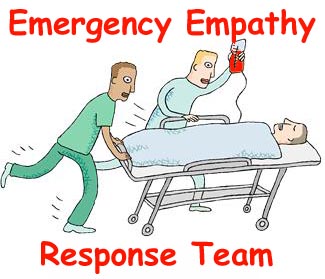|
|
Emergency Empathy Response Team
http://bit.ly/JLoxT7
 |
|
Emergency Empathy
Response Team.
Often in the media, TV, internet, etc, people make
comments, articles, videos that are negative, critical and
misinformed about the nature of empathy. Especially if it is in a
national media, this can effect how people view and understand the
importance of empathy
We have put together a team to immediately respond
with empathic listening, presence, dialog and education to these
criticisms. You're invited to join the team.
|
The response can consist of
1. a panel(s) discussion about the article/video/etc
2. a direct reply in the comment section of the piece.
3. an invitation to the author to join a group dialog and panel.
4. other ideas?
Here is an example of how this can work.
| |

|
I saw an article on Forbes Online Magazine titled
Great Negotiators Think With Heads, Not Hearts -
Empathy Can Subvert Human Well-Being by
Victoria Pynchon.
The article was rather critical of empathy, i.e. saying, 'Empathy Can
Subvert Human Well-Being' is rather negative and critical.
People see, read or hear this and that's what sticks in the minds.
Empathy is bad.. |
| |
 |
The Emergency Empathy Response Team (Edwin and Joe)
rushed into action and got together on a Skype video call and
reviewed, discussed, empathized with the author, made comments, etc.
about the article. We recorded that discussion, posted the video to
Youtube and wrote up the discussion in text format.
|
| |
|
The article author,
Victoria Pynchon found out
about this and posted the video to the end of her article in an
effort to stimulate dialog. |
| |
|
Joe and I started an email conversation with Victoria
, then the 3 of us set a time and held a video panel discussion about it.
|
| |
 |
Through this discussion, we were able to clear up a lot
misconceptions and inaccuracies about the nature of empathy and make a
new friend all at the same time.
- We clarified the difference between empathy and sympathy
- We explained the perspective taking and action components of
empathy.
- Explained the latest scientific understandings
|
| |
|
|
Join the team, we need,
Requirements to join
-
be well grounded in empathy
-
be available at a movements notice to join a Skype
based panel discussion to respond or
-
be willing to help in other ways
Typical criticisms or misunderstandings about empathy
(underdevelopment)
We will start systematically articulate the typical criticisms of empathy and develop
responses. For example,
-
there's a great deal of confusion
between empathy and sympathy.
-
often criticism is based on definitions and misunderstand of what it
means.
-
empathy is emotionalism
-
empathy does not have an action component.
-
empathy is emotional and we need reason
-
empathy is emotional and we need firm structures and
rules
Projects Needing a Response:
2005-06-00 - Getting Real About Empathy
by L.
P.
Issue in Brief
-
"Empathy,.... is too often thought of
as purely good. But empathy can be dysfunctional in some contexts.
And empathy can be exploited for evil purposes."
-
Empathy leads to the lack of empathy
-
Empathy has both positive and
negative effects.
-
can't count on empathy, we need
protection, prisons, etc.
-
"Empathy, far from alleviating
conflict, can cause or exacerbate it. Further, the drive to elevate
empathy above other traits is intolerant, short-sighted, and
unscientific."
Response
2015-01-15
-The
Empathy Epidemic By Ed Lasky
"One of the most overused and abused terms is
“empathy.” It has reached epidemic levels and is killing us...
The empathy should flow to hardworking
Americans trying to meet not just their own budgets but the budgets of
artists toiling away at truly valuable work-such as, oh, poetry slams
and the like. Empathy is misplaced and misused. Empathy should flow
towards victims of violence not perpetrators; to hardworking Americans
trying to meet their budgets not artists free to follow their artistic
muse; and should not be used to apologize and justify acts of terror.
This epidemic of empathy has to be stopped before it kills again and
again."
Against Empathy:
America’s pain, Barack Obama’s gain
- Kevin D. Williamson
"Just before the election, the Washington Post
fluttered about what it described as “Barack Obama’s empathy edge.”
The equally hardboiled reporters at Psychology Today pondered: “Is
Obama empathetic to a fault?” The Empath-in-Chief himself has said
that empathy rather than such bewhiskered qualities as constitutional
scrupulousness is his main concern when choosing Supreme Court
justices, of whom he demanded that they have “the empathy to recognize
what it’s like to be a young, teenaged mom, the empathy to understand
what it’s like to be poor or African-American or gay or disabled or
old. And that’s the criteria by which I’m going to be selecting my
judges."
| |
Great Negotiators Think With Heads, Not Hearts - Empathy Can Subvert
Human Well-Being,
Forbes (Done!)
by Victoria Pynchon
|
 |
The article was rather critical of empathy, i.e. saying, 'Empathy Can
Subvert Human Well-Being' is rather negative and critical.
People see, read or hear this and that's what sticks in the minds.
Empathy is bad.. The Emergency Empathy Response Team (Edwin and Joe)
rushed into action and got together on a Skype video call and
reviewed, discussed, empathized with the author, made comments, etc.
about the article. We recorded that discussion, posted the video to
Youtube and wrote up the discussion in text format. |
In This Corner - Empathy vs. Compassion,
Blogs (Done!)
by Steve Kenny
|
 |
The article tries to pit empathy and compassion
as somehow at odds with each other and say Liberals have
empathy and conservatives have compassion. There were various
criticisms of empathy and the extolling of compassion. There
were many misunderstandings about the science of how empathy
and compassion work. Joe and Edwin held a panel
discussion and reviewed the article. We posted a reply to the
authors and invited them to take part in a panel discussion.
So far no response. |
Empathy:
The New School Subject, Eagle Forum (next up)
Schools Need Less Emphasis on Empathy
by
Phyllis Schlafly
The Limits of Empathy, New York Times
by David Brooks
Sam Spade at
Starbucks, New York Times
by David Brooks
-
"We ought not jettison compassion, of course. Like
any of the human sentiments, however, it needs to be cultivated and
constrained by reflective deliberation about the world and our
obligations within it."
-
"focus attention on the core issues: order and rule
of law. "
Same-sex marriage: Empathy or
Right?
Charles Krauthammer
U.S. Senate -
Attacks on Empathy
( a major project to respond to this)
Is Your
Empathy Killing Your Career?
by
Barbara Oakley
Steven Pinker
Resources
Create a structured response
-
What is the criticism (judgment)
-
What is the misunderstanding
-
what is the response?
-
what is the fear?
-
-
What values are important to the author
-
|
|